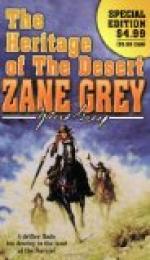August had spoken so easily, quite as if he were explaining how to shear a yearling sheep, that Jack’s feelings fluctuated between amazement and laughter. Verily this desert man was stripped of all the false fears of civilization.
“Now, Jack, I’m off. Good-bye and good luck. Mescal, look out for him. . . . So-ho! Noddle! Getup! Biscuit!” And with many a cheery word and slap he urged the burros into the forest, where they and his tall form soon disappeared among the trees.
Piute came stooping toward camp so burdened with coyotes that he could scarcely be seen under the gray pile. With a fervent “damn” he tumbled them under a cedar, and trotted back into the forest for another load. Jack insisted on assuming his share of the duties about camp; and Mescal assigned him to the task of gathering firewood, breaking red-hot sticks of wood into small pieces, and raking them into piles of live coals. Then they ate, these two alone. Jack did not do justice to the supper; excitement had robbed him of appetite. He told Mescal how he had crept upon the coyotes, how so many had eluded him, how he had missed a gray wolf. He plied her with questions about the sheep, and wanted to know if there would be more wolves, and if she thought the “silvertip” would come. He was quite carried away by the events of the day.
The sunset drew him to the rim. Dark clouds were mantling the desert like rolling smoke from a prairie-fire. He almost stumbled over Mescal, who sat with her back to a stone. Wolf lay with his head in her lap, and he growled.
“There’s a storm on the desert,” she said. “Those smoky streaks are flying sand. We may have snow to-night. It’s colder, and the wind is north. See, I’ve a blanket. You had better get one.”
He thanked her and went for it. Piute was eating his supper, and the peon had just come in. The bright campfire was agreeable, yet Hare did not feel cold. But he wrapped himself in a blanket and returned to Mescal and sat beside her. The desert lay indistinct in the foreground, inscrutable beyond; the canyon lost its line in gloom. The solemnity of the scene stilled his unrest, the strange freedom of longings unleashed that day. What had come over him? He shook his head; but with the consciousness of self returned a feeling of fatigue, the burning pain in his chest, the bitter-sweet smell of black sage and juniper.
“You love this outlook?” he asked.
“Yes.”
“Do you sit here often?”
“Every evening.”
“Is it the sunset that you care for, the roar of the river, just being here high above it all?”
“It’s that last, perhaps; I don’t know.”
“Haven’t you been lonely?”
“No.”
“You’d rather be here with the sheep than be in Lund, or Salt Lake City, as Esther and Judith want to be?”
“Yes.”




